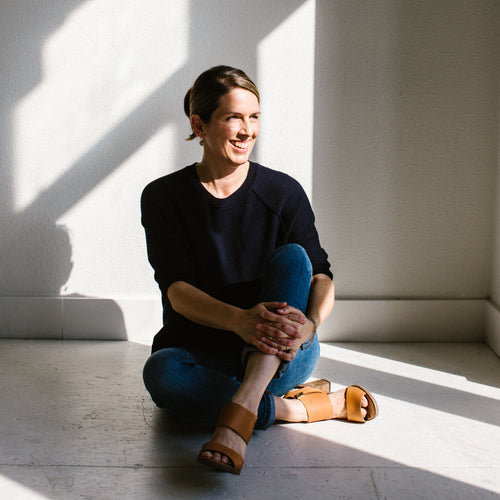My first memories of “making perfume” were as a young kid in the backyard on my family’s acreage.
From about age five onward, that gorgeous place was my playground. Through all the seasons, I explored the pastures, the winding creek that ran through them, the limestone ledges, the grove of pines, and the apple and pear orchard my dad planted on the far side of the creek. Our dog Patches and cat Bandit were right there with me too - happy sidekicks on any outdoor adventures.

The creek through the acreage.

Morning sun in the East yard.
In the warm seasons I gathered up interesting plants and petals constantly (plus a large collection of rocks and fossils that I stockpiled in the shed). Spring blooms were always my favorite: peonies, lilacs, bluebells, dandelions and tiny wild violets in vibrant purples and whites. Anything that was intriguing in texture, shape, or smell got collected, examined, and combined into colorful mixtures. I wish I had photos of those early creations!

Springtime in the pastures.

Bouquets of wild violets.

Even an as adult, I still gathered up little details around the yard and fields.
There was plenty of imagination involved in those early “perfumes.” The limestone rocks became mortar and pestle-type tools to smash petals and leaves into mushy mixtures. Water from the creek (and sometimes slimy green creek-plants) were added. Sticks and twigs were used to stir.
Even though it's more than forty years later now, my memory of that time is still clear: a joyful ease, fully engaged in nature. And I can see how that creative play and fascination with nature as a kid has evolved and expanded through my life:
- to travel and endless curiosity about plants, gardens and perfumes around the world (so many gardens and markets visited!)
- to formal study of complementary therapies and alternative medicine, much of which is centered around plant sciences and how they impact the human body, mind, and spirit
- to designing and planting my own gardens full of aromatic, medicinal and native plants
- and eventually to formulating my own natural skincare products and perfumes to share with others!

Visiting Grasse, France - the 'world capital' of perfumery

Butchart Gardens - Vancouver Island

'Perfume: A Sensory Journey Through Contemporary Scent' exhibit at Somerset House, London

Desert Botanical Gardens - Phoenix, Arizona

Blending a perfume in Grasse, France

Fresh food and herb market - Dubrovnik, Croatia
My perfume making process looks very different today, including more sophisticated ingredients and tools! But it still holds the same joy and playful ease. And the best part is sharing those beautiful blends with you.

Blending perfume in the Pure Luxe Apothecary workshop
So, why is natural perfume important?
There are benefits to choosing natural, small-batch brands over mainstream, mass-produced perfumes. Here are my top five:
-
Better for the Environment. Most mainstream perfumes generated by the fragrance industry are alcohol-based and either contain only synthetic ingredients or a mixture of botanicals and synthetic ingredients.
Synthetic compounds (made primarily from petroleum) are usually cheaper and easier to make, compared to plant-based ingredients. However, once a synthetic ingredient is produced, it doesn't easily break down and continues to circulate in air, water, and soil as a pollutant. And the resources used, plus by-products and waste that are produced in their manufacture, are important to consider too.
Natural ingredients like essential oils are biodegradable and don't persist as pollutants, so even though there are costs and resources involved in growing and producing them, overall they're a much better choice for the environment. Especially when conservation practices and protection of endangered habitats are put in place.
- Better for Skin and Allergies. Natural perfumes, especially those that are oil-based rather than alcohol-based, are more gentle on the skin and better for sensitivities and allergies. It's usually the synthetic ingredients that irritate the skin and nose. And synthetics can also act as endocrine disruptors, which is an ongoing problem in the fragrance and body care industries.
-
Positively Impact Mood and Energy. Plants interact with us on many levels (mind, body, spirit) to shift mood and energy. There's a large and growing body of research to back up their properties: a quick search in PubMed using the term 'essential oil properties' or something similar yields a lot of interesting data and reviews. Check it out sometime!
(A note on research: natural ingredients can't be patented, so there's not much incentive for large corporations to research and promote them, compared to a 'new' chemical - or drug - that can be patented and highly monetized.)
-
Less Intrusive to Others. Natural perfumes tend to be more subtle. The scent of an oil-based natural perfume stays closer to the body, rather than leaving a cloud of fragrance around you. They feel more personal, and because of this, they can be much better for the sensitivities and preferences of the people around you.
I also feel a scent is more intriguing when it’s not in-your-face-loud. It's true that natural scents don't last as long as synthetic scents, but for me that's a benefit. I prefer a perfume that doesn't 'stick' to me and my surroundings for ages.
- Unique and Different. Botanical blends of ingredients naturally evolve and change on the skin throughout the day, and they smell slightly different on each person. And because they're small-batch, there's a good chance the perfume you're wearing is unique and different from anyone around you.
Pure Luxe Apothecary's Essential Perfume Oils
When I formulate Pure Luxe Apothecary perfumes, my goal is to create beautiful fragrance combinations that are unique, elegant, and understated - even in all their botanical complexity.
Each perfume is a 20-30% concentration of essential oils in a base of jojoba oil (since jojoba easily absorbs into the skin). The slender glass bottle has a steel rollerball top for easy application. And like all Pure Luxe Apothecary products, there are never any synthetic ingredients, additives, colorants, or fixatives used.
No.3 Cypress Rose Essential Perfume Oil
Notes of Cypress, Sandalwood, and Rose
No.7 Ylang Ylang Essential Perfume Oil
Notes of Ylang Ylang, Cedarwood, Juniper, Black Pepper
No.8 Sacred Tulsi Essential Perfume Oil
Notes of Tulsi, Bergamot, Vetiver, Sweet Orange
I also created a Perfume Discovery Set with mini-vials of each perfume oil, making it easy to try them all and find your own favorites or combinations.

Thank you for choosing clean beauty and for supporting small-batch makers! Your choice has impact and matters. I hope you enjoy exploring the world of natural perfumes!

With gratitude,





